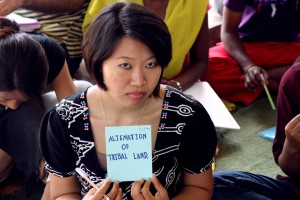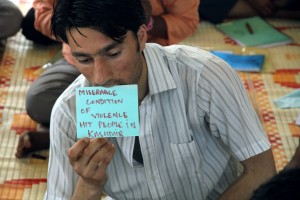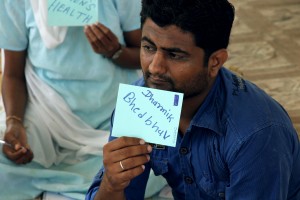During the IndiaUnheard training, director Stalin K held a special session on identity. The session saw community correspondents speaking aloud about issues that are dear to their hearts such as gender discrimination, caste-based violence, economic deprivation, terrorism and destruction of forest land. Each of the CCs has deep personal connection to the issue. In a candid interview, Stalin explained the importance of such a session and how it fits into the mould of community media. 
Identity. Most of the 20 people who have joined indiaunheard have had very interesting, traumatic and often violent experiences within their various identities of caste, religion and gender. Unlike the mainstream that says, ‘don’t put yourself into the story,’ we are saying they should include this. Today I did an exercise to help them understand their multiple identities and understand how to use this to be a community correspondent.
The first exercise was for people to list out the various identities they play in life: I’m a woman, a wife, a dalit, a friend, a teacher, a customer. Most listed around 15. Put down how many years you’ve spent on each, and put the ones that they’ve had for the longest on top. Then I asked them to cross out all the identities that are not chosen – such as woman, daughter, muslim. They realized that about 80-90% are unchosen. I then asked them to circle the ones that they would like to be recognized or that is their favorite. Most of them circled a chosen identity, like activist, or writer. Only three circled their chosen identities. It is interesting to note that most of our identities are choiceless, we want to be known for the ones we are creating for ourselves. The more empowered you are, the more chosen identities you will have on your list, and fulfilling yourself in that chosen identity is a way towards progress.
Then I asked them, ‘how many of you belong to an association based on your chosen identity?” none could, except for Video Volunteers and this community, saying it helps them express themselves as a videojournalist. So we talked about how most established associations are based on unchosen, not chosen, identities. We do not have access to communities that support us in our chosen identities and this is what it means to be a support to other people. This was very informative for them. 
Then I asked them to write down one issue they want to shout out to the world. They wrote it and silently, one by one, showed it to people. It was extremely moving. Then we asked them to come up one by one and quietly answer the question, “Why?” Why do you want to shout out about this. One person had written down corruption. Why? Because his father had died because of corruption. He had been asked by doctors to pay a bribe for a heart treatment, which he could not do so the doctors let him die. Two women talked about their experiences of rape in a very moving and dignified way. Our correspondents from Jammu and Kashmir talked about how awful it is to be labeled as a terrorist, extremist, all the time. Besides the way this kind of sharing builds community, it also allows us to understand the issues they are passionate about, so we can guide them in their storytelling back to the issue they care about. So we will use it in our process of mentoring them, but that said, we obviously won’t force anyone to tell a story about themselves that is too personal or scary.
How does this fit into community media?
Community media is about not just the story but the storyteller, and the audience will learn about both. And the storyteller often is the story. So these exercises encourage the correspondents to think about themselves and how they are touched as they tell a story. Community media is not just about reporting, it’s about revealing yourself. A community media producer has the right to put themselves in, to claim the platform. And this is empowering. A traditional journalist is supposed to keep themselves out, and so instead they put in their slant, their bias. Not so in community media. 
Community
We had an exercise yesterday where we said your community may be an identity like women, dalits, tribals, northeast indigenous tribes, etc. but we are telling them to also represent the geographic community and speak for all voiceless people there. VV believes in diversity and so we have actively sought out people from these ‘chosen identity minorities,’ and choose them in particular. But we also believe in the shared experiences of all poor people and their common experiences and so for VV, community usually means geographic community. So we don’t want a situation where a dalit correspondent only reports on Dalit issues.
Where will you go in the remaining training from here?
They are supposed to write one story a day in this training, so they will leave here with 11 executable stories. Exercises like these help us to build community and help us to know our correspondents better so we can communicate to other people about who they are.
What have been your favorite things about this training?
I love training and I love to see the sparks in their eyes and the warmth in their hearts as they start to see new possibilities. My training often start from the things they already know and I help them to see them in a new way and I feel very happy when they come to me and tell me how much it has meant.
The morning sessions.
Every day we look at one of the eleven IndiaUnheard themes. We write the theme on the board and then I help them figure out where does that theme intersect with our lives? So with gender, for instance, they would say, marriage, agriculture, health, decision-making, education, festivals. So they see how many stories are possible within a theme so they expand out the theme, or see that the theme, like gender, is often a prism, a way of looking at things. Or also we help them see how to narrow down a theme. So they might say, “I’d like to do a film on gender and festivals’ and we’d talk about how festivals is too broad, how about focusing on Diwali, or holi. This helps them define a story in one line, like, ‘in Bihar the experience of women of the festival of holi is different for men.” Then the rest of the process we teach them is to list out the characters, conflict and change.
Join Buland Bol Program to Strengthen the Voice of your Community
The Buland Bol program is for those members of the community, who would like to raise voices, to change the scenario for betterment and work towards equality and justice.
Poor fearful of being termed ‘Stateless’ – NRC
A Community of daily wage workers consisting of men, women and children living in Patna are being forced to prove their citizenship in the state.
